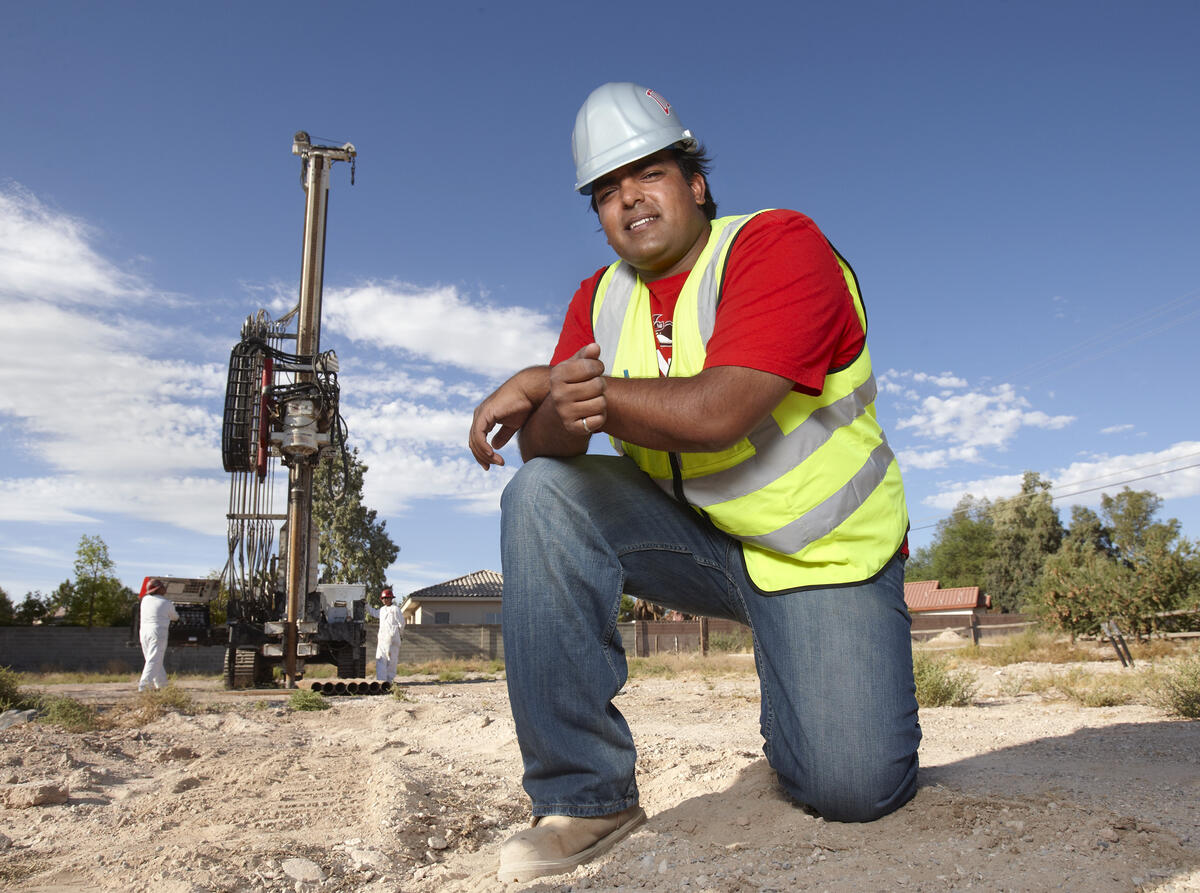Vik Sehdev
Master’s Degree Student
Construction Management, Howard R. Hughes College of Engineering
Research: I previously studied ways to develop ground source heat exchange systems, which utilize the earth’s constant temperatures to cool or heat water that is then used to help control building temperatures. What I learned about drilling from that research project has increased my interest in large tunneling projects. I’m now studying the project cycle for drilling, blasting, and stabilizing large tunnels used for water transmission and transportation.
Impact: I’m interested in making tunneling projects more time- and cost-efficient. I hope to link engineering and business savvy to maximize productivity on these types of projects. By focusing on the connection between time, materials, and money, we can bring these large civil engineering projects in on time and under budget.
Benefits: As an undergraduate in civil and environmental engineering in the Howard R. Hughes College of Engineering, I learned the basics. Now that I’m a graduate student, I’m learning to think outside the box, to understand issues influenced by many dynamic factors, and to discover answers to questions that no one has previously addressed. Conducting research teaches students these skills.
Career Goals: One of my goals is to become a successful executive for an international engineering and construction firm. I love the challenge of meeting an objective with a solution that is both profitable and revolutionary. For me to reach this goal, I need to build my expertise and gain experience. My graduate work has helped prepare me for my current position with Vegas Tunnel Constructors, which is building the third straw at Lake Mead.
Campus Affiliation: I formerly served as a graduate assistant, helping to promote UNLV’s recently established solar and renewable energy minor. I worked to recruit students interested in the program, conduct research, and assist on research-related projects. I’ll soon serve as an advisor to the student chapter of the American Society of Civil Engineers, and I’m a member of the Graduate and Professional Student Association.
Courtney Waldron
Undergraduate Student
Economics, College of Business
Research: My research sheds light on how members of the public perceive the risk of climate change and, in turn, how this impacts their willingness to pay for measures designed to limit the production of greenhouse gases. More specifically, I’m trying to determine if providing information about climate change affects research subjects’ willingness to bear actual monetary costs in support of measures resulting from international treaties or government action intended to stop climate change.
Impact: My research asks, “Is it worth it to us to try to stop global warming? How much value do we place on stopping climate change? Are we so uncertain about its future effects that we are willing to chance doing nothing?” My research addresses all of these questions. It also seeks to expand understanding of the influence that various sources of information, the media, and politics have on public opinion about a scientific issue. In a broader sense, the project helps illustrate how people perceive risk and how they behave in relation to these perceptions.
Benefits: Conducting research has challenged me to think about a problem in many different ways. I’ve loved the opportunity to really dig into the topic and be part of the solution to a problem. I have also learned that I would be happy to spend my career conducting research in economics.
Career goal: I’d like to pursue a Ph.D. in economics, but it’s difficult for me to say exactly what specialty within economics I’d choose at this stage of my life. There are so many interesting sub-fields of economics; I’m sure I’m not even aware of some yet! I could see myself spending a lifetime studying resource economics – which explores, for instance, how we get our energy and how we grow our food – or in the field of cultural economics, which examines the influence of the arts, architecture, and culture on economies.
Campus Affiliation: As a student in the Honors College, I’ve had the opportunity to explore my topic in depth this year. By the time I finish my bachelor’s degree, I will have produced a thorough, richly developed project. I’ll be extremely proud of the project, and it will help me greatly in graduate school.
Joseph Asante
Doctoral Student
Geoscience, College of Sciences
Research: I study groundwater in the lower Virgin River Basin and adjacent basins, examining spatial groundwater sources, movement, and discharge. I hope to gain a better understanding of the availability and sustainability of water resources in the lower Virgin River Basin and to develop a conceptual model of groundwater flow systems in a typical intermountain basin.
Impact: This study is critical because of the potential of these basins to supply water to the city of Las Vegas, communities near the state line between Nevada and Arizona, and irrigated agriculture in the area. It will provide the scientific knowledge needed for the sustainable development of the area’s water resources. Also, the procedures that will be developed can be used to characterize sources, movement, and discharge of groundwater in similar hydrogeologic settings.
Benefits: Through this study, I have begun to recognize the complexities of groundwater investigations, the vulnerability of groundwater to contamination, and the necessity of developing and managing resources on the basis of groundwater study information. I hope to contribute to my discipline’s understanding of developing and maintaining a sustainable water supply in desert areas such as Southern Nevada.
Career Goal: My career goal is to educate and conduct research on groundwater resource occurrence and movement, as well as on the processes that control water quality and related water quality protection and contamination issues.
Campus Affiliation: I have served as a graduate assistant through UNLV’s Urban Sustainability Initiative, which has enabled me to participate in a variety of campus events associated with sustainability and renewable energy.
Adla Earl
Doctoral Student
History, College of Liberal Arts
Research: I am currently conducting research on the incorporation of Indian Territory into the Confederacy at the moment of southern secession from the Union. For the Indian nations that had been removed from their homes in the southeastern portion of the U.S., the issues of education, transportation, and the health, safety, and welfare of their communities were all complicated by antagonistic relationships with the federal government and the southern states that had expelled them from their ancestral homelands.
Impact: This topic is important because it opens up new ways of exploring the debates over expansion, slavery, and states’ rights, all of which are considered critical to understanding the Civil War and the formation of regionally defined American identities. In general, the discipline of history is as much about critical thinking and problem solving as it is about discovering the past.
Benefits: I am cognizant of the importance of both funding and research to the foundation of academic success, and I believe that universities should seek to contribute to the community at large. Research helps build community relationships and facilitates this contribution.
Career Goal: I’ve completed my coursework and will now focus on taking the comprehensive exams and finishing my dissertation. My overall goal is to write about 19th century American history and to teach at an institution of higher learning while working with nonprofits and social organizations within the community.
Campus Affiliation: I am an active member of the UNLV chapter of Phi Alpha Theta, a national honor society for historians, and I serve as one of the editors of the chapter’s journal and as its webmaster. The chapter recently held a regional conference at UNLV, and I was on the planning committee and made a presentation as well. I also serve as a Lincy Institute graduate assistant, and I formerly served as the history department representative to the Graduate and Professional Student Association.
Cristina Macke
Undergraduate Student
Kinesiology, School of Allied Health Sciences
Research: Previously, I explored the best way to calculate an athlete’s work intensity during a game as compared to practice. This year, I will be performing a review of the various clinical tools designed to assess individuals’ balance.
Impact: The overarching goal of this review is to determine if solid research exists supporting the use of certain balance tools by physical therapists. I hope my research helps physical therapists better understand which techniques produce the most effective results for patients.
Benefits: Conducting research has improved my confidence in my academic abilities tenfold. I no longer question my ability to compile, interpret, and analyze scientific data. This will definitely smooth my transition from undergraduate to graduate-level studies.
Career Goal: After I receive my bachelor’s degree and complete the appropriate prerequisites, I hope to enroll in UNLV’s physical therapy doctoral program. Eventually, I would like to open my own physical therapy practice and apply my knowledge and skills by aiding in the rehabilitation of athletes and the care of geriatric populations.
Campus Affiliation: I’m a participant in the McNair Summer Research Institute, which promotes undergraduate research by enabling students to travel to national conferences to present their research findings and to meet other students involved in research. The institute also helps participants create a step-by-step plan to reach their goal of graduate school admission. Through this program, I was able to present my findings at the 11th National Conference for McNair Scholars at the University of Maryland last year. This was an incredible opportunity and great preparation for graduate school.
Abby Hasberry
Doctoral Student
Curriculum and Instruction, College of Education
Research: My research interests include the experiences of African-American teachers in predominantly white independent and/or suburban schools. More specifically, I focus on their coping strategies, the roles of mentoring and affinity groups, the effects of tokenism, and black racial identity development.
Impact: This research has financial implications for independent schools and implications for the recruitment and retention of both teachers and students of color. Studying the experiences and successes of black teachers will help schools create culturally sensitive environments, programs, and support for teachers of color. The more diverse the faculty, the easier it is to recruit a diverse student body and boost enrollment.
Benefits: As a new Nevadan – I moved here last year – I’ve found that conducting research has helped me become more familiar with education in Southern Nevada, as well as the research areas and expertise of the impressive UNLV faculty. In addition, it has given me valuable experiences in data mining, collection, and analysis that I will use in my future research.
Career Goal: I plan to teach at a university and work with an independent school association or in an independent school, either in administration or on a board working to help fulfill the diversity mission statement.
Campus Affiliation: I previously served as a graduate assistant for The Lincy Institute, which conducts and supports research that focuses on improving Nevada’s health care, education, and social services. I was responsible for collecting data on the funded, non-funded, and volunteer work of the faculty in the College of Education. Additionally, I collected data on Southern Nevada nonprofit organizations that work within the area of education. This data will be compiled with similar data on health and social services to form a report for The Lincy Institute to use as it evolves.



